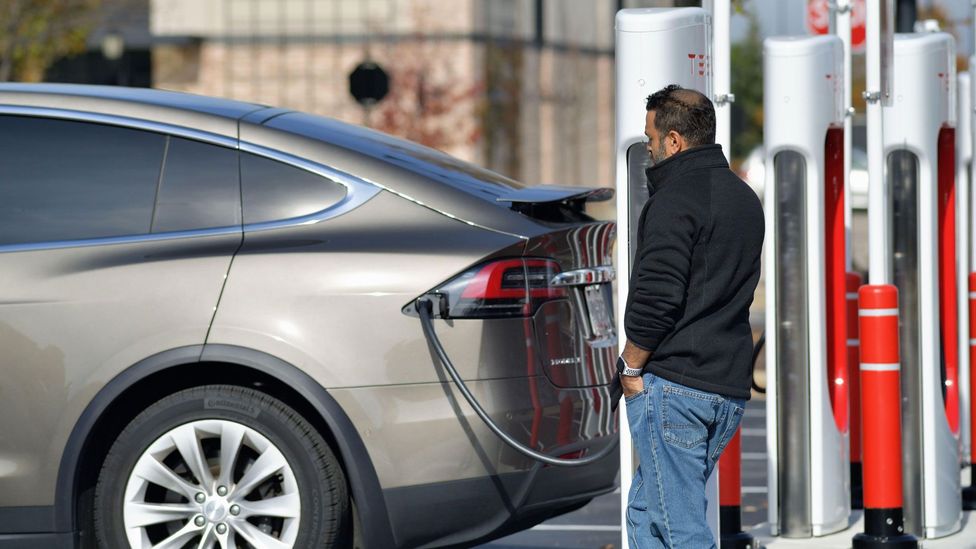US consumers are buying electric vehicles – just not at the pace some analysts predicted. A few core reasons keep the average consumer from moving past petrol.
T
Throughout the past few years, analysts have touted electric vehicles as the future of transport – one Americans would dive into, eagerly and rapidly. The EV market is indeed expanding, but the US’s electric vehicle ‘revolution’ appears to be happening much slower than some analysts and car manufacturers expected.
Since 2016, sales of EVs in the US have grown – from nearly 65,000 vehicles sold in 2017, to more than 800,000 vehicles in 2022. Data from auto analytics firm Motor Intelligence showed EV sales rose 51% in the first half of 2023, following the upwards trend. However, those gains are still a drop from last year’s 71% growth in the same timeframe. And Tesla, which leads the market with more than half of all EV sales, recently reported its lowest quarterly earnings in two years, leading to a $138bn (£111.4bn) drop in the company’s stock value.
Some American car manufacturers are taking new business decisions based on these signals.
General Motors – which two years ago announced a goal of phasing out internal combustion engines by 2035 – is pulling away from a production goal of 400,000 EVs by mid-2024. They’ve also cancelled plans to pair with Honda to build a line of more affordable EVs. At Ford, executives are delaying billions of dollars in EV investment, saying they don’t yet need the production capacity to meet demand.
It’s not that Americans don’t wantto buy EVs, says Elizabeth Krear, vice president of Electric Vehicle Practice at consumer-intelligence firm J.D. Power.
“We survey over 2,000 new vehicle shoppers to gauge their interest in EVs every single month,” she says. “In October, the percentage of new vehicle shoppers very likely to consider a full-battery electric vehicle reached an all-time high of 29.2%. So, almost one out of every three new vehicle shoppers are very likely to consider an EV for their next vehicle purchase.”
Yet a few core reasons have slowed the progress of EV adoption for US drivers – barriers that need solutions before American uptake can skyrocket as forecasted.
The affordability issue
Chief among these roadblocks is affordability. Even as prices come down, and the US introduces tax credits, EVs remain much more expensive than their combustion counterparts. With US interest rates at a two-decade high, the price tag for the average American car shopper is prohibitive.
Teslas have the largest EV market share, and are generally owned by upper-income individuals (Credit: Alamy)
“We looked at 13 years’ worth of electric vehicle prices in the US, and in inflation-adjusted dollars, the average price of an EV is going up, not down,” says Ashley Nunes, a senior research associate at Harvard Law School. This is quite problematic: if an everyday consumer is looking at the price of an EV and a gasoline powered car and seeing, depending on the day, a difference between $15,000 and $20,000 (£12,195 and £16,260), it’s pretty easy to figure out which option they’re going to select.”
Government programs strive to make prices more palatable, offering incentives to EV buyers. There’s a federal subsidy of $7,500 (£6,060) towards the purchase price, and several states offer an additional credit between $1,000 and $7,500 (£813 and £6,060). These extra incentives seem to be a determining factor as to whether consumers will make the purchase, says Krear: “Of the top 10 adoption states, five of them have state incentives.”
Yet they’re not in place everywhere yet, and Nunes says even the incentives don’t do much to move the needle on a wide scale.
Ultimately, they still can’t bring the price of an EV below that of a petrol-powered car, or into the realm of affordability for the average consumer. “The median income for a family of four is somewhere around $70,000 (£56,915). The average electric car in 2022 cost more than $60,000 (£48,784). So, think about that: the near equivalent of what you’re pulling in for the year,” he says.
Due to this prohibitive pricing, he adds “the majority of electric cars are currently purchased by upper-income individuals”. Tesla manufactured four of the top 10 most popular electric vehicles sold in 2023, ranging in base price from $35,000 (£28,450) for the Model Y to $101,000 (£82,120) for the Model X; the average Tesla owner according to Market Research firm Hedges & Company, had a household income near $150,000 (£121,200) in 2022.




